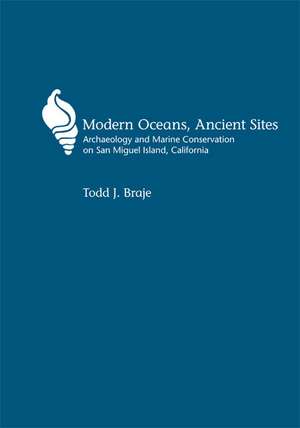Modern Oceans, Ancient Sites: Archaeology and Marine Conservation on San Miguel Island, California: Anthropology of Pacific North America
Autor Todd J Brajeen Limba Engleză Hardback – 30 oct 2009 – vârsta până la 80 ani
There is a growing consensus in the scientific realm that the world’s oceans are reaching a state of crisis as commercial fisheries are more widely overexploited and many coastal ecosystems are approaching collapse. A number of scientists and resource managers have argued that a successful understanding of the current crisis can be found through the development of a deeper historical perspective of the ecology of coastal ecosystems and the impacts that humans have had on them. In Modern Oceans, Ancient Sites: Archaeology and Marine Conservation on San Miguel Island, California, Todd Braje works to provide just such an understanding, bridging the divide between the archaeological record and the modern crisis.
Using archaeological, paleoecological, and historical datasets from California’s Channel Islands and the larger Santa Barbara Channel region, Braje explores the evolving relationship between humans and fragile island ecosystems. San Miguel Island, westernmost of the Northern Channel Islands, holds archaeological records spanning 10,000 years, providing a backdrop for the examination of changes in human demography, subsistence, and technology over time. Braje’s systematic excavations of five well-preserved sitesranging from a 9500-year-old shell midden to a 150-year-old abalone fishing camptranslate into a long-term case study that enables a unique assessment of the human impacts on marine ecosystems.
Modern Oceans, Ancient Sites: Archaeology and Marine Conservation on San Miguel Island, California helps to provide a more complete picture of human sea and land use through time, offering vital information for understanding, interpreting, and managing the past, present, and future of both the Channel Islands and global marine ecosystems. Braje demonstrates the relevance of archaeological, historical, and paleoecological data to extant environmental problems and concludes with tangible and practical recommendations for managing modern marine ecosystems and fisheries.
Preț: 281.11 lei
Nou
Puncte Express: 422
Preț estimativ în valută:
53.79€ • 56.32$ • 44.62£
53.79€ • 56.32$ • 44.62£
Carte indisponibilă temporar
Doresc să fiu notificat când acest titlu va fi disponibil:
Se trimite...
Preluare comenzi: 021 569.72.76
Specificații
ISBN-13: 9780874809848
ISBN-10: 0874809843
Pagini: 176
Ilustrații: 58 figures, 33 tables
Dimensiuni: 178 x 254 x 18 mm
Greutate: 0.54 kg
Ediția:1st Edition
Editura: University of Utah Press
Colecția University of Utah Press
Seria Anthropology of Pacific North America
ISBN-10: 0874809843
Pagini: 176
Ilustrații: 58 figures, 33 tables
Dimensiuni: 178 x 254 x 18 mm
Greutate: 0.54 kg
Ediția:1st Edition
Editura: University of Utah Press
Colecția University of Utah Press
Seria Anthropology of Pacific North America
Recenzii
"A significant contribution to the understanding of the far-reaching effects that technologically ‘primitive’ prehistoric human populations can have on marine resources and the potential the same have for rehabilitation through enlightened management with a deeper historical perspective."—Thomas Wake, The Cotsen Institute of Archaeology at UCLA
"This book is a significant contribution to the field of archaeology. It helps fill in important data gaps on the archaeology of San Miguel Island and presents an excellent case study in historical ecology."—René L. Vellanoweth, Humboldt State University
"In his book, Modern Oceans, Ancient Sites, Todd Braje provides a promising avenue through which archaeologists can help solve modern problems—by providing time depth to ecological conservation efforts.... The data in these chapters are valuable and well presented.... The introductions and conclusions of each chapter nicely place the data within the big picture argument."
—California Archaeology
—California Archaeology
Notă biografică
Todd J. Braje is an anthropological archaeologist who specializes in the archaeology and historical ecology of North American Pacific Coast maritime societies. He is an assistant professor of anthropology at Humboldt State University.
Cuprins
List of Figures
List of Tables
Acknowledgments
1. Introduction
2. A Natural and Cultural History of the Santa Barbara Channel
3. Modeling of Human Impacts
4. The Early Holocene: Archaeology of CA-SMI-608
5. The Middle Holocene: Archaeology of CA-SMI-657
6. A Middle to Late Holocene Transition: Archaeology of CA-SMI-628
7. The Late Holocene: Archaeology of CA-SMI-232
8. The Historic Period: Archaeology of CA-SMI-558
9. Archaeology and Historical Ecology on San Miguel Island
10. Modern Lessons from Ancient Oceans
References
Index
List of Tables
Acknowledgments
1. Introduction
2. A Natural and Cultural History of the Santa Barbara Channel
3. Modeling of Human Impacts
4. The Early Holocene: Archaeology of CA-SMI-608
5. The Middle Holocene: Archaeology of CA-SMI-657
6. A Middle to Late Holocene Transition: Archaeology of CA-SMI-628
7. The Late Holocene: Archaeology of CA-SMI-232
8. The Historic Period: Archaeology of CA-SMI-558
9. Archaeology and Historical Ecology on San Miguel Island
10. Modern Lessons from Ancient Oceans
References
Index
Descriere
Provides a deep historical perspective of the ecology of coastal ecosystems and human impacts on them in order to bridge the divide between the archaeological record and the modern oceanic crises.


